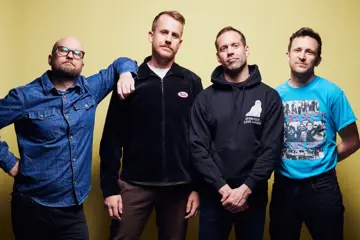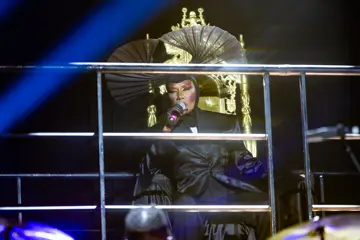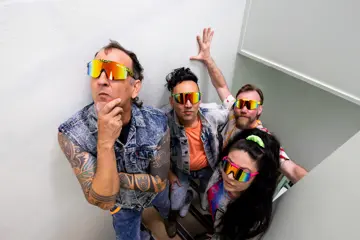LONG SHOT
★★★1/2
When a film is billed as a ‘crowdpleaser’, I instantly flinch in revulsion. Perhaps if you’re fond of shameless pandering or swelling strings, have low expectations or are just old, you may be pleased by the standard-issue crowdpleaser. But, for your old pal Film Carew, crowdpleasers usually bring a harsh dose of displeasure. Little Miss Sunshine is still one of my most hated in-cinema experiences ever; seriously, fuck that film. Because what’s ultimately pleasing isn’t twee narrative contrivance or upbeat song-placements, but, y’know, good cinema.
Good cinema isn’t, perhaps, what you’ll be expecting from Long Shot. It’s a rom-com plain and simple, one in which a pair of charismatic movie-stars — Seth Rogen and Charlize Theron — play an original-odd-couple who fall into an unlikely romance, find it tested ten minutes before the credits, and end up together after a grand public declaration of love. Its title refers to Rogen’s chances of wooing the ‘unattainable’ Theron, but it could just as easily refer to the odds of a straight-up rom-com being, y’know, good cinema.
But holy fuck is this thing charming; are these charismatic-movie-stars charismatic. Long Shot is genuinely delightful. I was delighted. I was, you may even say, pleased. I’d say the crowd was, too, except I literally watched this in a cinema by myself, the only person who showed up for an 11am opening-morning session. They say laughter is a social phenomenon, people more ready to LOL when in a gathered social setting, feeling the connection of the crowd, the common bonding of this universal human trait. But, sitting in that cinema by myself, I was laughing my ass off, having a grand old time. Especially anytime O’Shea Jackson Jr — who, after his Ingrid Goes West turn, is again a fine comic form — was on screen.
Rogen plays a shit-kicking, fuck-the-power journalist who rage-quits when his Brooklynista paper is purchased by a Murdoch-esque media mogul (played by a swimming-in-prosthetics Andy Serkis). His life suddenly, radically changes when he bumps into Theron, once his childhood babysitter, now a political heavy-hitter serving as Secretary Of State and planning a presidential campaign. Here, there’s a simple inversion of screen-romance gender stereotypes, from Pretty Woman through 50 Shades Of Grey and A Star Is Born; Theron is the one who uses her money, celebrity, power, and private-jets to whisk a younger object-of-affection into a whole new glittering world.
Don't miss a beat with our FREE daily newsletter
The reason they’re thrown together is evidence of the film’s unexpectedly-sharp political satire. Market-researchers show that voters give Theron's character a less-than-stellar ranking for her sense-of-humour; thus, a funny writer needs to be found. Improving this score, Lisa Kudrow’s glassy-eyed demographer imparts, is important; more important than actual policies, which voters don’t care about.
The sitting president (Bob Odenkirk), who once played a President on a West Wing-esque TV show, isn’t going to campaign for re-election, planning to pivot to a more prestigious world than politics: acting in movies. He’s an idiot, but his televisual celebrity inures him to an American public who’ve dangerously conflated television fantasy with political reality (imagine!). For a woman in politics, though, there’s the thinnest of margins of error, endless obstacles to success; Theron forced to walk a narrow line in living up to a mythical ideal. “If I’m angry, I’m hysterical; if I’m emotional, I’m weak; If I ever raise my voice, I’m a bitch,” she says, simply; the court of public opinion’s gender disparity spoken plainly.
A career in politics has taught her pragmatism; whereas Rogen, living a civilian life, is allowed to indulge in idealism. This is the seed of their inevitable conflict; discrepancies in ideology, in what beliefs you’re willing to sacrifice, a surprisingly adult — and specifically political — problem to momentarily push apart our willingly-shipped paramours. The screenplay, written by Dan Sterling (who explored a similar comic riff on the global-political stage with The Interview) and Liz Hannah (who expertly chronicled political/journalistic machinations on The Post), succeeds because it avoids the trappings of farce, doesn’t employ some generic antagonist or male-insecurity cliché to momentarily separate our couple for that key rock-bottom montage.
Most rom-coms usually present archetypes, if not stereotypes, for their gender-norm leads; here, part of the unexpected charm comes from the fact that these movie-stars are actually playing characters that feel like real people, contrary and complex, capable of empathy, rationality, and perspective. Here, the screenplay steers away from making the premise the joke; instead, it makes it the drama.
For the comedy, Rogen leans on his regular comic schtick and familiar screen persona, but, this deep into his career, he can also find the truth therein, convey the real emotions playing out underneath the lulz. Theron makes a case she’s one of contemporary’s cinema’s most underrated actors, her character the ultimate embodiment of the screenplay’s understanding of human complexity. Jackson kills every scene he’s in (his line-reading of the simple phrase “that might be” is perfect), June Diane Raphael nails her role as flinty behind-the-scenes campaign-managing power-player, and Alexander Skarsgård satirically addresses his own dull-hunk status by playing a Trudeau-esque Canadian-prime-minister-as-handsome-but-bland babe.
The players all elevate a script that is sharply-written and very funny. Even the pop-cultural-nostalgia references used to shamelessly court audiences — references to Encino Man and 90210, Boyz II Men and Blossom, songs from Roxette to Robyn — work. Just because their function is obvious doesn’t stop them from being effective. Which is, essentially, what a crowdpleaser really is: a film where you know you’re being pandered to, but the pandering is so charming you don’t give a shit.
In the words of my hero Peter K Rosenthal, “not every movie needs to be Schindler’s-fucking-List”. The Long Shot sure isn’t that. But maybe it’s something better: a rom-com that actually brought joy to my blackened, withered heart.
GLORIA BELL
★★★1/2
Once upon a time, in a distant history we’ll call 2013, Chilean filmmaker Sebastián Lelio made a film called Gloria. It was great: a bittersweet, hilarious-yet-sad, deeply-humanist portrait of a 50-something divorcée’s attempts to find new love. It boasted a glorious lead performance from Paulina García, who won the Best Actress prize at the Berlin Film Festival, and served as Lelio’s breakout. When Hollywood came calling, asking about an English-language remake, he did something unexpected: signing on to helm his own remake. Before doing so, Lelio furthered his auteurist status, directing the brilliant, Oscar-winning A Fantastic Woman and steamy sex-vs-religion drama Disobedience. Now, here he is, playing that old jam anew, with Gloria turned Gloria Bell, his plum leading-lady role now expertly inhabited by Julianne Moore.
It’s essentially the same story, changing locations and details, but preserving all — in script, drama, depiction, sequences, and paintball-revenge — that worked so well last time. Moore plays the titular role, a grown woman entering into a relationship with a retired man-child (played, here, by John Turturro) who fails her on so many levels. The stakes are small, the characters well-observed, the details precise; and Moore makes her character feel duly alive, an ageing woman in all her complexity.
Stylistically, though, is where this remake receives some real polish. There’s a bigger budget, and Lelio is a far more accomplished director, now; in its neon lights, thoughtful frames, and Matthew Hebert score, Gloria Bell is a stylistic kin to A Fantastic Woman. It’s strikingly beautiful, and expertly mounted. Even if you’ve literally seen this story before.
ALL IS TRUE
★★★
Kenneth Branagh has largely built a career — on stage and on screen — from performing Shakespeare. In All Is True, he straight-up just plays William Shakespeare. Serving as both director and star, Branagh portrays ‘Will’ in his dying days, the lion in winter retiring back home in the rural English idyll, having put down the pen after his London theatre, the Globe, burnt to the ground. After years spent away, to his family — wife Judi Dench, grown daughters Kathryn Wilder and Lydia Wilson — he feels like a stranger; an absent father/husband who’s suddenly become present. His return opens old wounds, forces him to confront his failures as father, and, eventually, brings a sense of closure. This is one of those films where someone effectively puts their affairs in order — grieving his son who died young, making amends for his parental shittiness, coming to peace with the life he’s led — then dies.
There’s a curious push/pull at work, in this picture, between Branagh’s fondness for staginess, and the hopes of making something more cinematic. All Is True begins, firmly, in the latter camp: its opening act taking place amid pregnant pauses and telling silences, its dialogue spare, measured. There’s moments of ephemeral scandal — one daughter shamed as a wanton “fornicator”, the other picking up with a local souse who’s already knocked up one girl — but, largely, Branagh tends to a garden while symbolic autumn leaves fall.
But, there are scenes set aside for grand monologues and parrying dialogue; all housed inside, amid the thick-shadows and soft glow of candlelit low-light. When a dandyish Earl (Ian McKellen) pays a visit, the two men sit by the fire, and talk verbosely, of lives and reputations, merit and poetry; the suggestion of homoerotic tension between nobleman and writer first palpable, then openly implied. The dramatic showstopper is a scene where Branagh, Wilder, and Dench sit in a tableau staged to evoke a family divide, and Branagh is allowed, after so much hangdog underplaying, to yell and stomp and bang tables. In this moment, his Shakespeare feels Shakespearean; for the rest of the film, he’s played like a man internally wrestling with an unexpected burden.
PETERLOO
★★★1/2
Peterloo begins with a history-lesson title-card — black-and-white facts about Napoleon and the Duke Of Wellington — that gives context to its early-19th-century setting. But, by the end, Mike Leigh’s picture is clearly intended as a lesson for the currents: that if we don’t learn from history, we’re doomed to repeat it; its grand-scale staging of a massacre of pro-democracy protestors having eerie evocations of contemporaneous videos of militarised police issuing inhuman violence against citizens agitating for simple human rights.
It spans four years of English history, from the Battle Of Waterloo to a massacre dubbed Peterloo, where a mass gathering of reformists, meeting in a field in Manchester, were slaughtered by armed forces doing the bidding of the wealthy elite. It’s an unalloyed polemic, a sober retelling of a dark time in English history, sincere in its political reverence. Where Leigh found fame for his rigorous preparatory process — in which actors spent months in workshops, digging deep into their characters — here all his rigour is applied to historical research. Here, events are recounted as they happened, the words spoken torn from records of judicial rulings, orated speeches, written letters, printed newspapers, published declamations.
At times, this means the film borders on dry, Leigh’s past studies of human behaviour sidelined by a picture studying the mechanisms of social structures, hierarchal power-dynamics, and the tragedies that happen when class divisions erode empathy and breed enmity. Yet, for many, this will feel all too heavy-handed: the working class all pained and wearied; the upper class haughty buffoons sneering at the pitiable paupers, a rabble they need to rule with rod and yoke. Yet, this is Peterloo’s historical accuracy at work: the most ridiculous dismissals (“We are their moral superiors! It is our Christian duty to bring the axe down on this riotous mob!”) not exclamations of panto villainy, but an accurate depiction of the ruling elite’s circa-1819 views on those commoners daring to fight for their rights. While there’s none of the accomplishment of Mr Turner or abundant charm of Topsy-Turvy, Leigh’s latest historical picture is, at the very least, a fabulous corrective against the very-British industry of period-pieces. There’s no nostalgia for the old Empire, only a sober, thorough chronicle of its true horrors.
ACUTE MISFORTUNE
★★★★
When actor Thomas M Wright first read an excerpt from Erik Jensen’s biography of artist Adam Cullen, he wondered: “Why would anybody bother to write a book about this fuckin’ asshole?” And yet Wright soon found himself adapting Acute Misfortune as his debut directorial effort. The book in question is a study of the relationship between biographer and subject, Jensen spending years being drawn deeper into the world of a painter who verily embodies toxic masculinity.
Dramatically, Acute Misfortune is an arm wrestling two-hander, in which artist and writer grapple in an “unholy negotiation”. Jensen (played by Toby Wallace, last seen on the Romper Stomper TV show) is young and hungry, throwing himself wholly into a brief of his own making, alarm bells ringing not due to his ambition, but his blithe lack of concern for boundaries. He’s egged on, and dragged down, by Cullen (played brilliantly by Daniel Henshall), who’s more a study in the charismatic sociopath than the 'Great Male Artist'.
Across its taut 90 minutes, the downward spiral of this dance summons a horror movie’s sense of slowly mounting dread. As a willing collaborator in the fashioning of narrative, Cullen’s whole life becomes, in turn, a kind of theatre; there's a performative quality to his macho boasts, his endless dick-swinging, his gun-shooting. Rather than making art, Cullen is seen as being more invested in selling a persona, telling a story. “This’ll be good for the book,” Cullen says, both impishly and pragmatically, when he’s about to shoot up heroin in front of Jensen.
There’s the obligatory self-destructive drugs and drunkenness, this yet another artist biopic where you know you’re following the subject towards oblivion, and an early grave. But Wright is out to poke at these familiar cliches, to prod at an Australian art world that venerated a man adorned with swastika tattoos. Acute Misfortune’s boxy framing makes the film feel like it’s pressing in on both subject and audience. As its artistic antagonist grows more erratic, horrible, and menacing in behaviour, Wright’s direction effectively imprisons the audience in the middle of a dysfunctional relationship, one thoughtfully addressing the contemporary conversation about conflating the artist and their work.
THE NIGHT EATS THE WORLD
★★★1/2
Apocalyptic male-competency-fantasies are given a comic spin in Dominique Rocher’s minimalist zombie flick. Sam (Anders Danielsen Lie) wakes up in a Parisian apartment, where he passed out the night before at a wild party. He soon discovers that outside this enclave, the streets are swarming with brain-eating hordes; and that he is, somehow, an Omega man, holed up upon high in this apartment block. After undertaking early reconnaissance missions in the building — in search of supplies, and, hopefully, other survivors — and applying post-apocalyptic life-hacks, he soon settles into this self-contained world, safe from the masses outside.
Only, he’s really fucking bored. Faced with a life, alone, in an apartment, he finds himself fighting off the tedium with time-killing, from tennis-ball-against-wall throwing to Rear Window-styled peering at neighbouring buildings, and the zombie masses. In such, The Night Eats The World is less a thriller, more a film of existential contemplation, and a wry commentary on the prevalence of the genre. It’s a simple idea, contained within a single location, absent any narrative bloat. On the page — its source text a book by French writer Martin Page — much of that existential contemplation can spill out in words. Here, Rocher, a debutante director, has to attempt to capture interiority, never an easy task.
Ultimately, there’s some shortcuts into Sam’s thoughts: monologues spoken, locked-up zombies turned into comic sounding boards, and the eventual, inevitable arrival of another person (Golshifteh Farahani, no less). Like anyone out to survive a plague, they have to weigh up self-preservation vs the desire to escape the nightmare they’re trapped in. Most zombie movies play that nightmare as one of danger, terror, flight; here, our hero’s greatest horror may be boredom.
ÁGA
★★★★
With its anamorphic frame, bleached-out palette, and vignetted corners, Ága looks vintage. Where that visual shorthand can be employed to evoke a specific past, here the old-timeyness is in service of a deliberate timelessness. Milko Lazarov’s picture starts out in yurt-movie territory, chronicling the lives of an aging Yakut couple living in a transient tent set upon Arctic ice, in the frozen wastelands of Siberia. Their daily routines — trapping, fishing, weaving, stoking fires — make it feel as if this story could be taking place at any point in history; the vintage frame perhaps, suggesting, something from centuries ago, a movie playing like a folktale.
Then, unexpectedly, we hear the sound of a snowmobile, and the parameters suddenly shift: this ancient-seeming story instantly dragged into the contemporaneous day. With that knowledge, we notice new details in their routines: that animals are few and sickly; that the ice seems softer; that keeping these old traditions feels like stubbornness. Our couple — Nanook(!!!) (Mikhail Aprosimov) and Sedna (Feodosia Ivanova) — go from seeming like the only lovers left alive to the last of a dying breed.
The narrative of Ága is, eventually, about the encroaching threats of modernity, environment, and discontent upon traditional lives, and traditional cultures. Nanook heads out on the most desolate of roadtrips, slowly inching his way to something approach modern civilisation. In turn, Lazarov lets tension slyly mount, chiefly by rarely cutting. The film, and his rounded frames, look beautiful, but there’s a sense of dread throughout. Ága eventually builds up its tension, visuals, and music to a finale that feels almost operatic in scale, its final pullaway a remarkable shot whose staging suggests deep themes and genuine directorial ambition.
3 FACES
★★★★
In the face of persecution from the Iranian government, Jafar Panahi famously kept working: covertly making films while under house arrest, using the limits of his domestic imprisonment as a creative spur in This Is Not A Film and Closed Curtain, where the confined spaces carried heavy symbolic weight. With Tehran Taxi, Panahi used a car as a kind of mobile confinement; evoking Abbas Kiarostami as he used the automobile as a stage, and a safe space, for conversations about greater Iranian society. With 3 Faces, Panahi takes this to the logical next step: heading out on the highway for a genuine roadtrip, into remote northern mountains by the Azerbaijani border. Here, the distance from Tehran conveys both artistic and narrative freedom, the spectre of censorship falling away with each passing mile.
Panahi again plays himself, or at least a version of, who’s begrudgingly lured into a quixotic mission by the actress Behnaz Jafari, who’s also playing herself, or a version thereof. A striking opening scene shows the seeming live-streamed death, of a rural girl (Marziyeh Rezaei), with her dreams of pursuing acting in the city stifled by tradition and gender expectations. But as actor and director, Panahi and Jafari know when something is a little too stagey.
And, so, they set out to track down this girl. Along the way, they encounter various locals, learn of the cultures and customs (and dialects) that colour each village, grapple with social mores, and interrogate their own artistic responsibility. Ultimately, 3 Faces inevitably becomes another film navigating what it means to live under the yoke of oppression, be it for your artistic expression or your gender.
THE DAYS TO COME
★★★★1/2
Few narratives are as familiar as a pregnancy. Where so much of reality resists the simplicity of a linear story, a pregnancy, as either lived experience or told tale, proceeds with form intact. Three trimesters are like three acts, and the climax is foretold from the first. The Days To Come — currently screening at the Spanish Film Festival — isn’t just a movie made along these narrative lines, but one that obliterates the lines between the dramatic and the real.
It’s the third film by the 36-year-old Catalan director Carlos Marqués-Marcet, who is fast becoming one of my favourite directors, and one of the great cinematic students of human relationships. His first film, 2014’s 10.000 Km, depicted a long-distance romance almost entirely via Skype, with David Verdaguer and Natalia Tena playing a couple suddenly divided by a continent. His second film, 2017’s Anchor And Hope, found Tena and her Game Of Thrones co-star Oona Chaplin playing a same-sex couple living in London, who rope in their quirky Spanish friend (Verdaguer, again) into serving as lo-tech, ad-hoc sperm donor. Whilst filming Anchor And Hope, Verdageur told Marqués-Marcet that he and his partner, fellow actor Maria Rodríguez Soto, were pregnant. And, so, the director and his recurring actor immediately threw themselves into a new project, chronicling how a couple’s relationship changes with an unexpected — and rapidly-approaching — pregnancy.
As he did with 10.000 Km, Marqués-Marcet shows how a sudden, radical change in conditions inexplicably alters the dynamic of a relationship, and how those within it respond to these changes. Adding extra weight and profundity to the observant, finely-tuned, actor-centric drama is the fact that Verdageur and Rodríguez are living this pregnancy while fashioning a fictional narrative running parallel. Erasing the dramatic divide further is a recurring device where Rodríguez watches the actual home videos of her own birth, with her real-life parents also appearing as her on-screen parents. In turn, The Days To Come feels like a keenly-felt, carefully-mounted drama shot through with a genuine dose of vérité. It feels like one of the truest depictions of a pregnancy ever brought to screen, in more ways than one.















